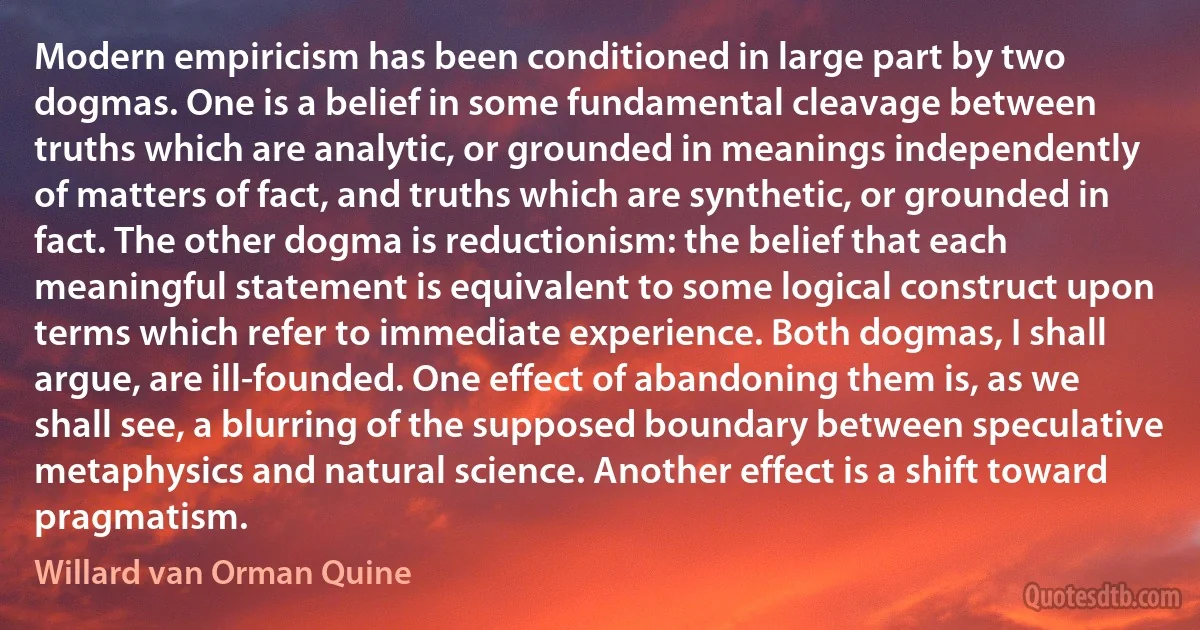
Modern empiricism has been conditioned in large part by two dogmas. One is a belief in some fundamental cleavage between truths which are analytic, or grounded in meanings independently of matters of fact, and truths which are synthetic, or grounded in fact. The other dogma is reductionism: the belief that each meaningful statement is equivalent to some logical construct upon terms which refer to immediate experience. Both dogmas, I shall argue, are ill-founded. One effect of abandoning them is, as we shall see, a blurring of the supposed boundary between speculative metaphysics and natural science. Another effect is a shift toward pragmatism.
Willard van Orman QuineRelated topics
abandoning blurring cleavage construct empiricism experience fundamental large metaphysics natural pragmatism science see synthetic reductionismRelated quotes
My own prejudices are exactly the opposite of the functionalists': "If you want to understand function, study structure,” I was supposed to have said in my molecular biology days. (I believe I was sailing at the time.) I think that one should approach these problems at all levels, as was done in molecular biology. Classical genetics is, after all, a black-box subject. The important thing was to combine it with biochemistry. In nature hybrid species are usually sterile, but in science the reverse is often true. Hybrid subjects are often astonishingly fertile, whereas if a scientific discipline remains too pure it usually wilts.

Francis Crick
The statistical study presented in the following pages may be best defined as an attempt to construct, on the basis of available statistical materials, a Tableau Economique of the United States for 1919 and 1929. One hundred and fifty years ago, when Quesnay first published his famous scheme, his contemporaries and disciples acclaimed it as the greatest discovery since Newton's laws. The idea of general interdepence among the various part of the economic system has become by now the very foundation of economic analysis. Yet, when it comes to the practical application of this theoretical tool, modern economists must rely exactly as Quesnay did upon fictitious numerical examples.

Wassily Leontief
We must allow every day of our lives to represent healthy closure now! When we live for love, this is most natural because all of our associations will be quality associations in which we share our compassion, determination, and realizations, and receive the same from others. This is the technology of how to celebrate life now and live with proper preparation and detachment, so that we will master the science of dying before dying so as to connect with the should and its home-the spiritual world. After all, death is to remove all that is false and secondary. I am that lowly beggar who is desperately trying to die before dying.

Bhakti Tirtha Swami
What is a charitable heart? It is a heart which is burning with love for the whole creation, for men, for the birds, for the beasts ... for all creatures. He who has such a heart cannot see or call to mind a creature without his eyes being filled with tears by reason of the immense compassion which seizes his heart; a heart which is softened and can no longer bear to see or learn from others of any suffering, even the smallest pain being inflicted upon a creature. That is why such a man never ceases to pray for the animals ... [He is] ... moved by the infinite pity which reigns in the hearts of those who are becoming united with God.

Isaac the Syrian
The lack of individual prayer and communion with God has divorced modern Christians and Christian sects from Jesus' teaching of the real perception of God, as is true also of all religious paths inaugurated by God-sent prophets whose followers drift into byways of dogma and ritual rather than actual God-communion. Those paths that have no esoteric soul-lifting training busy themselves with dogma and building walls to exclude people with different ideas. Divine persons who really perceive God include everybody within the path of their love, not in the concept of an eclectic congregation but in respectful divine friendship toward all true lovers of God and the saints of all religions.

Paramahansa Yogananda
